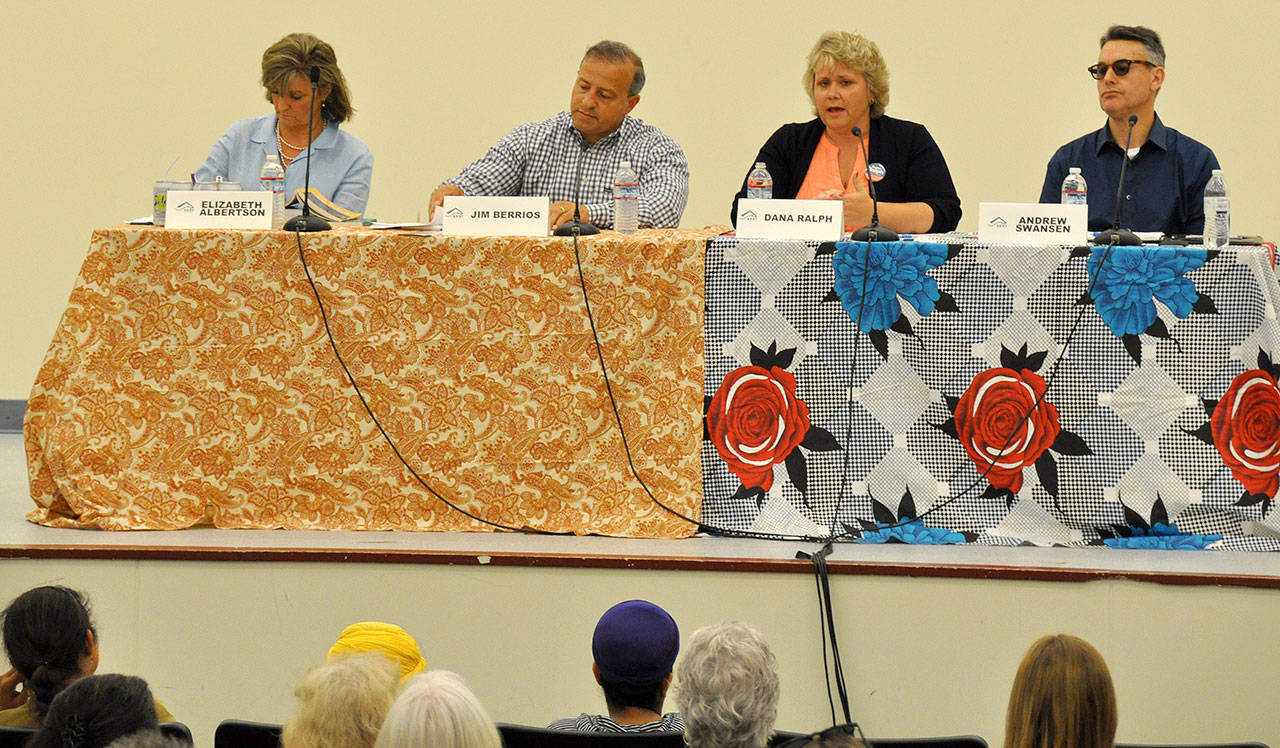The city of Kent’s potential loss of millions of dollars of state-shared revenue became a hot topic among the four candidates at a Tuesday night mayoral forum.
City Council members Jim Berrios and Dana Ralph, former councilwoman Elizabeth Albertson and political newcomer Andrew Swansen talked about what’s known as Kent’s “fiscal cliff,” part of a 90-minute forum for the Aug. 1 primary that covered several issues at the Kent-Meridian High School East Wing Auditorium.
The council heard a report from City Finance Director Aaron BeMiller on June 20 that Kent is expected to lose (starting in 2020) the $4.7 million it receives each year from the state for the Panther Lake annexation in 2010. Kent also could lose in the near future about $5 million per year it gets from the state (streamlined sales tax mitigation) to help compensate for revenue lost when legislators changed the state in 2008 from an origin-based system for local retail sales tax to a destination-based system, gutting the tax revenue the city received from its large warehouse district.
“We need to be careful on how we communicate this information,” said Berrios, who added it’s uncertain that Kent will lose the streamlined sales tax funds. “We had a recent conversation about this and it seemed like times that it was doom and gloom. I’ve had people coming to me and saying, ‘Oh my gosh, we have a big cliff that we are going to go off of.’ A good leader will pause and wait to see what the facts are going to be. Once you have that facts, then you react and do what you have to do to make things right.”
Berrios, owner of the Golden Steer Steak ‘n Rib House on the East Hill and in his fourth year on the council, said he has dealt with financial shortfalls while on the Kent School Board, which reached out to residents to see what should be kept or cut.
“We can’t provide all of these services, what would you like for us to adjust?” Berrios said of what would be the key question to determine what direction the city should go.
Ralph, who runs a medical billing service business and is in her sixth year on council, disagreed with Berrios that the streamlined sales tax might not go away. She said in her talks with state officials that money will be lost.
“I think it’s time we need to educate our citizens and start talking about this,” Ralph said. “We need to make sure people understand where we are at and where we are probably going to end up. I would much rather plan for the worst and celebrate if it doesn’t happen than get caught and say I wish we had figured this out sooner.
“We need to go out on the road and engage as many people as possible. … We need to start figuring out ways to do things differently. This meeting (workshop) ends up as a headline in the paper, but it prompts people to ask questions and that kind of dialogue is the only way we will get through this.”
Swansen, who works as a chief information officer for Seattle Colleges, attended the fiscal cliff council workshop. At the forum, he criticized city leaders for failing to get the word out sooner.
“The worst that you can do is keep people in the dark,” Swansen said. “That’s happened here a lot. We haven’t been honest with people and have not done a good job of planning for this. This loss of revenue has been known about for years. This is another reason why I’m running for mayor. It was not planned for at all. We should not be in this position.
“But we have to hold town halls, do some road shows, talk to the business leaders,” Swansen said. “Like it or not, we are not in a good position, but we need to communicate this as soon as possible. The things we don’t tell people, it’s worse for somebody. If they knew what was going to happen, they could plan for it.”
Albertson, who served on the council from 2006 to 2013, said as a city leader she would ask the Ports of Seattle and Tacoma to step up about the streamlined sales tax issue in an effort to get revenue.
“I’m not going to ask the people who live here to step up and pay all kinds of other taxes and fees so the rest of the people in the state can store their stuff here until it needs to move,” she said.
Albertson also said when the council in 2012 approved the creation of a business and occupation tax she didn’t favor all of the revenue going into road maintenance. She claimed anything above the first $5 million in revenue was supposed to go to park maintenance and other capital projects. The city now gets about $9 million per year from the B&O tax.
“As soon as I leave the council, they put it all into roads,” she said. “I don’t understand what’s going on but I can tell when Kent’s in trouble. This mismanagement has got to stop.”
Editor’s Note: This story has been updated to clarify a quote by Elizabeth Albertson about the Ports of Seattle and Tacoma.
Talk to us
Please share your story tips by emailing editor@kentreporter.com.
To share your opinion for publication, submit a letter through our website https://www.kentreporter.com/submit-letter/. Include your name, address and daytime phone number. (We’ll only publish your name and hometown.) Please keep letters to 300 words or less.

